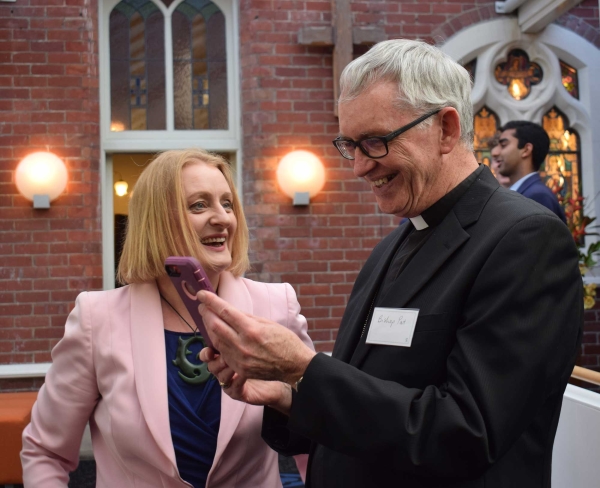Newly-installed Ministry for Vulnerable Children chief executive Grainne Moss said the biggest job of the ministry is to “change the public narrative in New Zealand” about vulnerable children.
Mrs Moss, who took charge of the new agency five months ago, spoke at the fundraising dinner for Auckland Bishop Patrick Dunn’s Catholic Caring Foundation on September 30 at the diocesan centre in Ponsonby.
“I really do object to the stigmatisation of the children who just haven’t been born into the right environment at the right time,” she said. “If we, as New Zealanders, have low aspiration for those children [who start] off being abused and neglected, well, we know that they will never achieve.”
She said research shows that when there are aspirations for children, they will meet those aspirations.
“They have that seed of greatness inside them and we have to find that and promote it,” she said.
Sadly, she admitted the previous ministry, Child, Youth and Family Services, had lost the trust and confidence of the public.
“When a ministry loses the trust and confidence of the public, it means the children don’t get help because people don’t call us,” she said.
Mrs Moss said their way of earning back the trust of the public is to make sure that children’s voices are listened to.
She related that when the ministry was thinking about branding, they gave the job to a group of children and young people, getting design experts only for support and guidance.
“I handed all of the decision rights around the branding, the colours, the pictures, the values and said to these young people, ‘you’re in charge. This is your ministry. What do you want it to look like? What do you want it to feel like?,’” she said.
She said the children took the responsibility seriously and stepped up to the plate.
“That’s what we need to continue to do. That’s what we need to do differently as a ministry. We haven’t done that well in the past. We’ve run a system for adults, not for children,” she said.
Mrs Moss rued the “little p” politics that seem to permeate delivery of services to children.
“There’s an awful lot of politics,” she said, not involving politicians but around service providers, staff and iwi organisations.
“I had one organisation say . . . ‘what are you going to do about our voice?’ I said, ‘actually, I’m here to make the voice of the child [heard] and what the child’s needs are and that will always be at the foremost of what we do,” she said.
She said while there had been a lot of negative reports about the ministry’s failings in the past, “there’s absolutely fabulous work that is going on across the sector and it’s making a difference to the kids in New Zealand”.
She called on everyone to be role models for the children so the children can see what opportunities are out there.
“Children don’t live in organisations. They don’t live in government systems. They live in communities. They live in families,” she said. “So whilst we in the ministry have a role to play, we actually have to support the community to step up.”

Reader Interactions